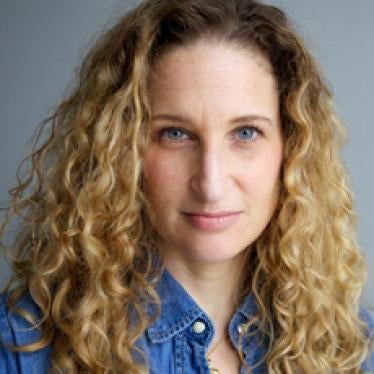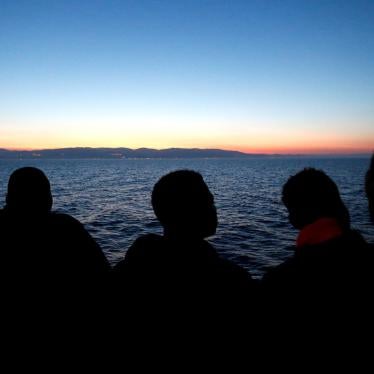Sexual violence against asylum seekers along the migration route to Europe, particularly in Libya, is making headlines these days, and rightly so. Few are paying attention, however, to what happens when survivors of rape make it to European shores.
On visits to reception centers for asylum seekers in Italy’s Lombardy and Veneto regions in March, I found that even the simplest steps to facilitate care and support for sexual violence survivors were lacking.
Without female interpreters, many asylum seekers may decline to talk about sexual violence or have difficulty getting information about available services. Yet most centers I visited, constrained by limited human and financial resources, did not have female interpreters, or in some cases, any full-time interpreters for key languages.
At a center in Veneto, only one part-time, male interpreter was available to help Eritrean asylum seekers who spoke Tigrinya, the Eritrean language. When any of the approximately 20 female Eritrean asylum seekers have medical problems, two women told me, they get by with their limited English. “We cannot express anything at the time we’re feeling it,” said Mariam (names have been changed), 24. “Even if we wanted to approach the staff, how could we?”
Amira, a 22-year old Eritrean at a center on the outskirts of Milan, told me that smugglers in Libya had raped her when she was five months pregnant. She said the men held her captive in a room with about 20 other women and girls, beating them and demanding money. The men selected women and girls to bring outside and rape. “They were choosing them every night,” she recalled. “They picked me, too. I said I was pregnant. They didn’t care. I thought they would stop, but they didn’t. They raped me.”
Fearful of gossip, Amira had not told anyone about the rape since arriving in Italy two months earlier. The center had only a male Eritrean interpreter, but its Italian director – who does not speak Tigrinya -- assured me that none of the residents had specifically requested a female interpreter or social worker, and dismissed concerns about whether they might prefer discussing sensitive topics with another woman. “I know them very well,” she said. “They can approach me. I’m part of the family.”
The fact that asylum seekers haven’t asked for a same-sex interpreter should not be misconstrued as a lack of need, especially when the inability to communicate may itself be prohibitive. And the burden of asking for one shouldn't be on asylum seekers.
This is only one of many barriers that prevent sexual violence survivors in reception centers from getting help. In some cases, survivors felt staff were indifferent. Michelle, a 23-year-old Nigerian, told me that two young men abducted her in Libya, raped her, and then left her bleeding in the desert. She had visited the reception center’s health clinic for abdominal pain, but did not tell the doctor about the rape. “He wasn’t interested,” she said. “He didn’t ask.”
While survivors of sexual violence should never be pressured to discuss a traumatic incident, opening the door to discussion can facilitate access to help and support. Several women said I was the first person they had told about being raped, in part because I was the first person who had asked.
Staff at many reception centers we visited do their best to create a welcoming environment and assist asylum seekers. But they need support, including specialized training and supervision. As one health worker at a center in the Veneto region said, “Being a nurse and being a nurse in this reality are totally different things.” Staff we spoke with – including directors, counsellors, doctors, nurses, psychologists, legal service providers, and interpreters—typically had no training on identifying and responding to trauma or sexual and other gender-based violence, nor any previous experience in working with refugees, migrants, or asylum seekers.
Some facilities I visited lacked basic facilities. In one Veneto center, two psychologists conducted individual sessions with asylum seekers in a shared room, with only a fabric screen for privacy. The psychologists said they make do by focusing on their own client, which keeps them from hearing their counterpart’s session and allows them to sense if their client is eavesdropping on another. “Sometimes they’re speaking different languages, so that helps,” one psychologist added. While reception center staff often need to improvise in sub-par conditions, a lack of confidentiality hinders patient care, and makes it less likely that deeply traumatized survivors of sexual violence will get the help they need.
Despite over 1,400 deaths of those attempting to reach Italy by sea so far in 2017, arrivals show no signs of slowing. Italy’s reception system, already hosting over 170,000 asylum-seekers as of May, is under enormous strain. Government plans foresee 200,000 spots for 2017, but over 50,000 sea arrivals in 2017 thus far could push the system to the breaking point.
Greater coordination and cooperation among Italy’s regional governments can improve reception center conditions and services. This includes developing national protocols for preventing and responding to gender-based violence at reception centers, in line with the Istanbul Convention on violence against women, to which Italy is a party. European Union member states should also show solidarity by following through on pledges to relocate refugees and asylum seekers, and offering greater financial support.
But the scale of the challenges facing Italy’s government don’t justify a failure to act. Italy—as every country receiving refugees—has obligations to provide protection, services, and support to asylum seekers who have experienced violence. Ensuring minimum best practice standards in reception centers – including same-sex interpreters, trained staff, and confidential spaces—is a first crucial step.









